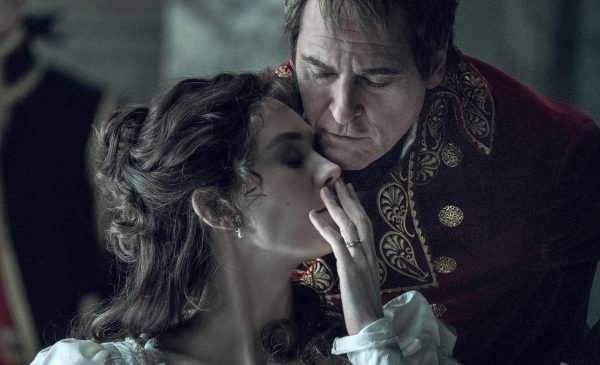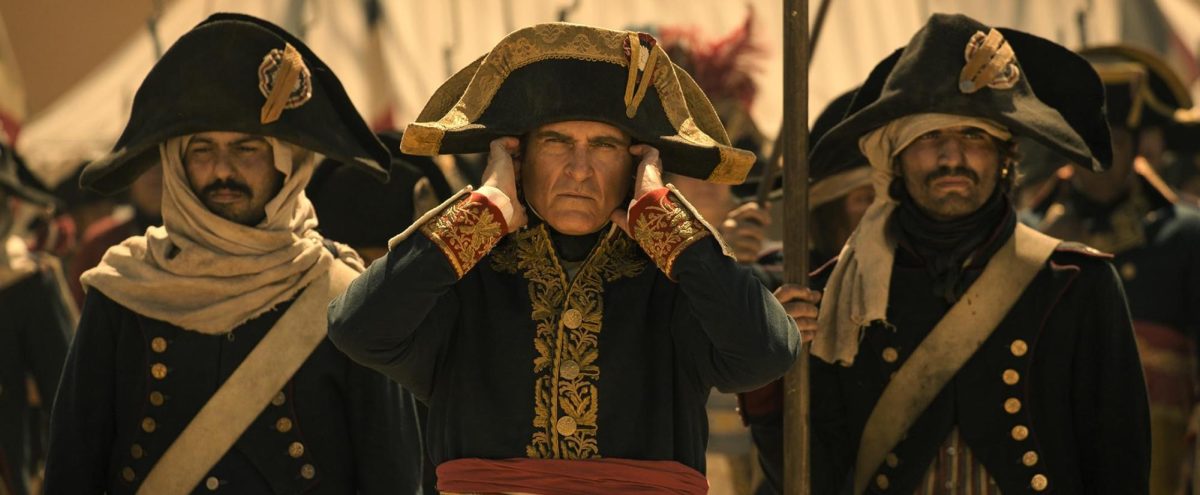“Napoleon” tells the story of the meteoric rise of the eponymous Corsican military man to the Emperor of France to an exiled monarch in a breathtaking 158 minutes.
This historical epic is made in partnership with Apple Original Films and Sony Pictures. It’s Apple’s second attempt this year — after Martin Scorsese’s “Killers of the Flower Moon” — to enter the awards race by throwing a ridiculous amount of cash at a well-respected director so they might make their passion project.
Director Ridley Scott is no stranger to directing grand sweeping epics that balance action and dramas like “Gladiator” and “The Last Duel.” With actor Joaquin Phoenix as the lead in “Napoleon,” there’s no better duo to portray the larger-than-life historical figure.
A Perfect Pair

Phoenix is front and center throughout the movie. He never falters. It’s a wonder the budget didn’t skyrocket from the actor chewing the scenery every moment on screen.
Between leading battles to politics, Phoenix gives Napoleon that “je ne sais quoi” only a seasoned actor can deliver. In addition to having a large screen presence, Napoleon is funny, in a pathetic sort of way. Many jokes have been made about Napoleon’s height, even though he was of average stature for the time. However, the movie makes clear his “Napoleon Complex” comes from deep-rooted insecurities.
For all Napoleon’s military feats, the battlefield he could never conquer was marriage. In between militant battles, the film emphasizes his relationship with Joséphine de Beauharnais (Vanessa Kirby). Beauharnais was an aristocrat recently freed from the radical revolutionary government and desperate to once again climb the social ladder.
The two make wonderful screen partners as the film emphasizes how utterly toxic the pair were. Kirby gives Beauharnais some much-needed dignity as a woman with limited mobility forging her way through an undignified world.
It’s difficult to point out other noteworthy performances. Apart from the two leads, characters come and go, in some cases, never to be seen again. This makes sense to a degree as they are based on real people who would’ve fallen out of the history books. Even still, every actor gives their best performance.
A Director Delivers

The movie is at its peak in the battle scenes. Napoleon led dozens of campaigns and attacks throughout his life. His military mind is put on display with Scott’s direction.
There are grandiose, sweeping shots of cavalry and infantry and closer more intimate moments of extreme violence. Ridley shows what brutal war can do to human — and even horse — bodies.
One of the biggest complaints is pacing. Between battle scenes, the story loses momentum. It’s understandable considering it spans over 20 years of history. A potential remedy to this complaint could be the upcoming 4-hour director’s cut of the movie coming to Apple TV+.
Artistic Integrity or Historical Accuracy?
Another complaint is the historical accuracy of the film. Some of the fiercest critics have been the French, criticizing the tone and perspective. When asked about this in an interview with the BBC, Scott said, “The French don’t even like themselves. The audience that I showed it to in Paris, they loved it.”
The BAFTA and Golden Globe award-winning director has shone when speaking about the technical aspects of the film. However, his replies to direct criticisms of factuality have been flippant at best. For example, Napoleon did invade and take Egypt, but there’s no historical evidence that he directly attacked the pyramids. In an interview with The Times, Scott said, “I don’t know if he did that, but it was a fast way of saying he took Egypt.”
Scott’s developed cinematic technique is well-established. At a certain point, however, an audience member needs to ask themselves what’s more important, artistic integrity or historical accuracy? Based on previews and industry projections, it seems audiences have already spoken.
“Napoleon” earned $19.6 million in the three days after its Nov. 22 opening. It was projected to earn $30-33 million over the entire five-day holiday weekend. Globally industry projections show an $70-73 million debut.
The historical epic carries a $200 million budget. At the time of publication, the film has a 60% critical score and 59% audience score on Rotten Tomatoes, a 6.7 user rating on IMDB, a B- CinemaScore and a 3.2-star rating on LetterBoxd. These ratings are good, but unlike Napoleon’s life – not great.



